#tolkien probably neither
Explore tagged Tumblr posts
Text
i just realised one thing
Nargothrond fell before Second Kinslaying happened, but obviously after Celebrimbor turned his back on his father
and we all know how little people fled from Nargothrond...
.........so Curufin died, probably being sure that his son is already dead or held captive by Morgoth
#man i love angst#sorry to everyone seing this#no im not#tolkien probably neither#have fun#curufin#curufinwë#tyelperinquar#celebrimbor#fëanorians#nargothrond#tolkien#silmarillion
345 notes
·
View notes
Text




The Descent of the Minyar
okay so ik that a popular hc is that Finwë, Ingwë and the like are of the first gen of the elves but ngl i think its very interesting if they arent! And also ik that Indis is Ingwë's niece but i like them better as siblings. I'll be getting one of these up for the Ñoldor and Teleri too when I finish them.
Names below cut! (Pretty long bc it includes all names and not just made-up ones, so you've been warned)
Primitive Elvish=PE; Early, Middle, Late Quenya= EQ, MQ, LQ. Anything with ? is unknown or speculative
Imin [?PE?]- One? (Masc)
Iminyē [?PE?] - One? (Fem)
Minyakwēn [PE] - First One
Melnā [PE] - Beloved
Arispar [PE] - Good Hunter
Stalmā [PE] - Strong hand
Lindaómë [EQ] - Voice of Singers
Takolumë [EQ] - Body-fixer
Kalwayéma [EQ] - Fair-Face
Isqael [EQ] - Wise One
Píneakolumë [EQ] - Small-Bodied
Nereäri [EQ] - Intensively/Very Stout
Ilwen [?EQ?] - Unknown, perhaps Sky
Kalimáma [MQ] - Bright-Mind
Ingwë [EQ-LQ] - Prince/Chief
Airehröa [LQ] - Holy-Bodied
Indis [?MQ-LQ?] - Bride/Wife
Ingalótë [EQ-LQ] - Top Flower
Airesáma [EQ-LQ] - Holy-Minded
Finwë [EQ] - Hair
Nolwë [EQ] - Bold/Brave
Ñoldóran [?EQ-LQ?] - King of the Ñoldor
Ingalaurë [EQ-LQ] - Top Gold
Airefëa [LQ] - Holy-Spirit
Éveähúna [MQ-LQ] - Future-Cursed
Laiwantë [EQ-MQ] - Pale-Face
Ingwion [?EQ-LQ?] - Son of Ingwë
Meldahínë [MQ-LQ] - Beloved Child
Findis [?EQ-LQ?] - Hair?
Laurefindelë [?EQ-LQ?] - Golden Haired
Umbarnáro [EQ-LQ] - Fire Fated
Illicenítë [?EQ-LQ?] - All-Seeing
Ñolofinwë [?PE-LQ?] - Wise-Finwë
Arakáno (Aracáno) [?MQ-LQ? ] - High Chieftan
Írimë [?MQ-LQ? ] - Lovely
Lalwendë [?EQ-LQ? ] - Laughing Maiden
Arafinwë [?EQ-LQ? ] - Wise-Finwë
Ingoldo [?PE-LQ?] - The Eminent/ The Ñoldo
#im gonna be honest the worst part of this was the naming#thank GOD i did that part first#did you know neither primitive elvish nor quenya has a word for stubborn bc i had to find that out#anyways ill probably get ones on the Noldor and Teleri in like a week or two respectively#also indis and finwe really pulled from all sources when they named their kids like??#nolofinwe and ingoldo both have primitive elvish roots#i spent hours going through eldamo for their names so even tho my art is okay theres that#alright tags#tolkien#silmarillion#the silmarillion#Ingwë#Indis#Finwë#Vanyar#Minyar#Fingolfin#Finarfin#Findis#Lalwen#Glorfindel#xiphoids art#i think those are the only ones i can tag#ingwion#??#FUCK me dude my hand hurts#i have SO many thoughts abt all of them and if asked i WILL talk and that is a THREAT
30 notes
·
View notes
Text
No, Charles Edwards Isn't Too Old to Play Celebrimbor, Actually: a sourcebook
Apparently this particular wank is going around again, and people are trying to frame it as an issue of fidelity to the source material (again), so I decided to round up some references to the physical appearance of certain Elves in the books.
Before we even begin, I'm going to point out that there are literally no physical descriptions of Celebrimbor in canon. Nothing. Nada. Zilch. So you could cast literally anyone and it wouldn't ~break canon~. But the age of the actor seems to be a big sticking point for some people.
In the main, yes, Tolkien's elves tend to appear youthful beyond their many, many years, but there are some notable examples. One of the most extreme is Gwindor, who spends many years as a thrall in Angband and eventually returns to his own people "now seeming as one of the aged among mortal Men, because of his torments and his labours". Gwindor is an extreme example, though, the result of exceptional trauma. There are more natural examples, though.
The big one is Círdan the Shipwright, memorably described thus: "his beard was long, and he was grey and old, save that his eyes were keen as stars."
Elrond, meanwhile, at the end of the Third Age appears somewhere in the middle: "The face of Elrond was ageless, neither old nor young." Contrast with Glorfindel, who is considerably older than him - give or take a death/re-embodiment episode - whose face is described as "fair and young" just one paragraph earlier.
Then we have the sons of Elrond, who are probably among the youngest Elves in Middle-earth at the end of the Third Age, but who seem to take after their father, being described as "neither young nor old", but at the same time with "elven-fair" faces.
By any human yardstick, it doesn't seem logical that Glorfindel should appear obviously younger than Elrond or his sons. You could argue that their half-elven nature might admit signs of ageing where other Elves wouldn't, but then we have Arwen, daughter of Elrond. She is well over two thousand years old - though barely a hundred years younger than her brothers - but she appears young. When the twenty-year-old Aragorn first beholds her, we're told, "she had seemed of no greater age than he" - at least until he sees the elven-light in her eyes. (Note that when Frodo first sees Arwen, the book says, "Young she was and yet not so" - though, like many Elves, this seems to have more to do with the wisdom and memory apparent in her demeanour, because we're also told that in terms of physical appearance "The braids of her dark hair were touched by no frost; her white arms and clear face were flawless and smooth".
So it's clear we have a lot of variation between Elves' relative ages and the "age" of their appearance. I've seen some attempts to pass off the negativity over Charles Edwards' casting to concerns over sexist double-standards: why is a 50-something actor playing Celebrimbor when Galadriel, who is canonically older, is played by an actress in her thirties? But frankly, I'm calling bullshit on that one, because when the Fellowship meet Galadriel and Celeborn (again, this is at the end of the Third Age), the book tells us: "no sign of age was upon them, unless it were in the depths of their eyes." This is despite these two being among the oldest Elves still living in Middle-earth. So if Galadriel can appear more youthful than, say, Elrond and his sons, why could she not potentially appear more youthful that Celebrimbor (of whom, again, we have no physical description)? If there is a double-standard in evidence, I'm afraid it's one that must be traced back to Tolkien himself.
Frankly, I think it's fairly obvious that a lot of the wank about Charles Edwards' Celebrimbor stems from people being unable or unwilling to separate fanon from canon. It's not exactly a secret that in the main, fandom tends to portray Celebrimbor as hunky and youthful, and I've seen plenty of mean-spirited posts opining that he's too unattractive to play the character (which on the "fucking the old man" website is hilarious). But like, beauty is subjective.
And even within the books, there are variations in beauty and body types. Remember Nerdanel, a master artisan despite being "not among the fairest of her people"? (Even if you don't personally find the actor attractive, why couldn't Celebrimbor take after his grandmother in this respect?) The Fall of Gondolin also, memorably, gives us the "heavy and squat" Salgant. There are rare exceptions, true, but it's quite apparent that canonically, Elves don't conform to any one standard of beauty or body type.
As for complaints about him being too light-haired to play a grandson of Fëanor? Look, I tend to imagine Celebrimbor as black-haired when I'm reading the books, but the fact is, canon is utterly silent on the subject. For all we know, his mother could be light-haired and he could take after her. Or - idk - he uses the same Laurelin Sheen hair-dye as Uncle Celegorm. (Because somehow fandom seems to have no problem with him being portrayed as Extremely! Blond! despite having even less excuse. As a side note, I'm sure Elven genetics don't work quite the same way as human ones - like, I feel an attempt to draw up an Elven Punnett square would probably result in madness. But whatever.)
In conclusion, then: Tolkien's Elves clearly display variations in their appearance of ageing, which have nothing to do with their actual age. Canon gives us exactly no descriptions of Celebrimbor's physical appearance, therefore the casting of Charles Edwards can't be regarded as in any way uncanonical. Attempts to dress up complaints about his age and looks as anything more worthy are blatantly disingenuous, when they're not being downright immature and mean-spirited.
Personally, I think Edwards is a fine actor, and while he doesn't fit my own image of the character, he does fit lots of the personality beats I associate with him, which can be gleaned from canon, and which frankly matter much more to me. I'm very much looking forward to seeing his performance in series two. Thank you for coming to my rant talk.
#The Rings of Power#fandom wankery#Celebrimbor#Charles Edwards#once again I am asking fandom to relearn the difference between fanon and canon
172 notes
·
View notes
Text
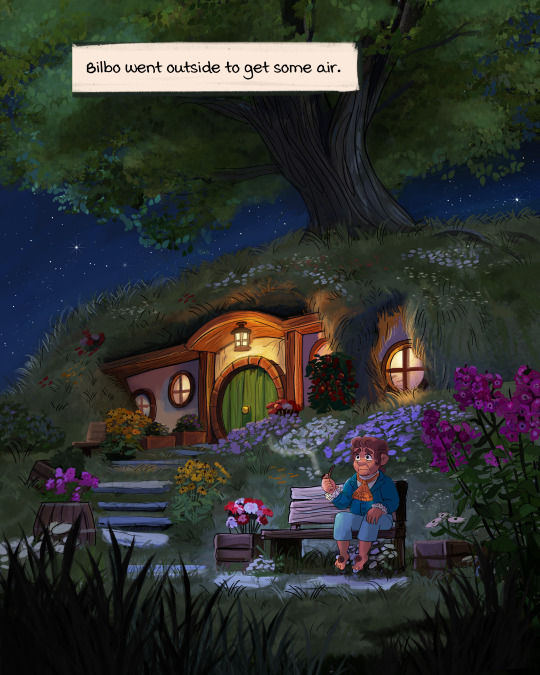
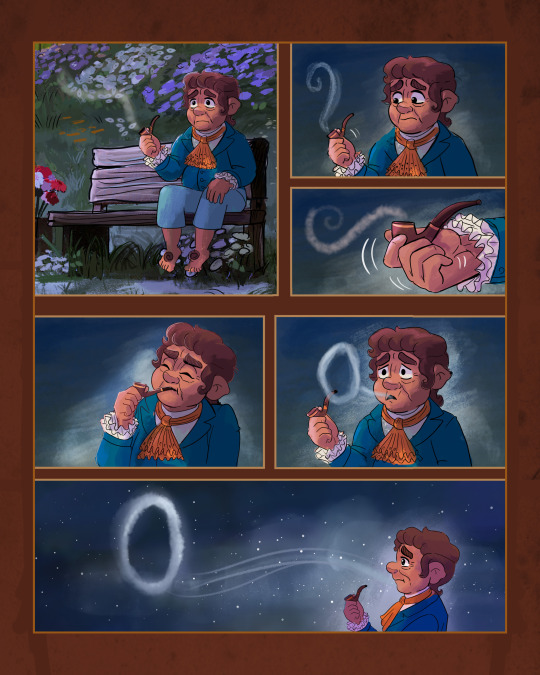
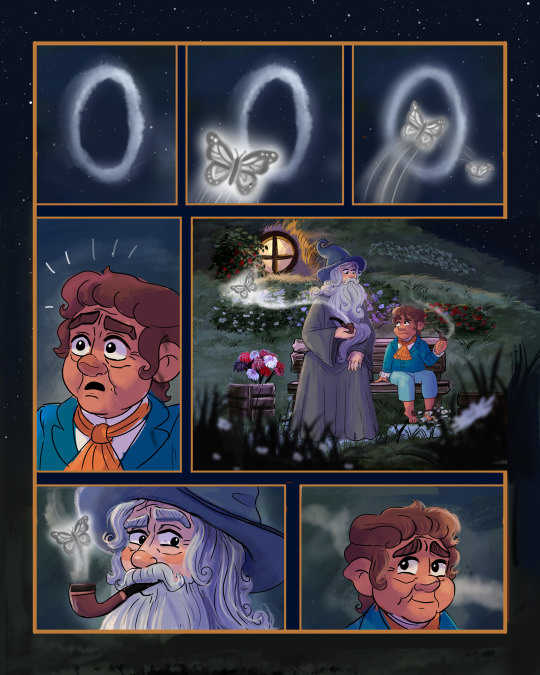
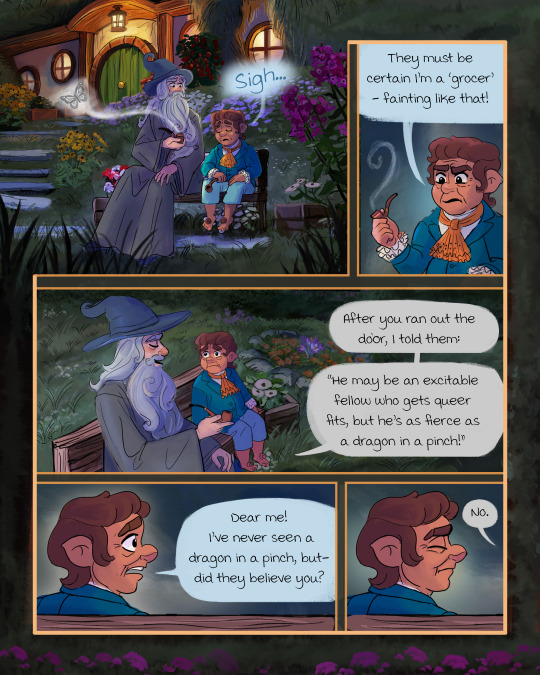
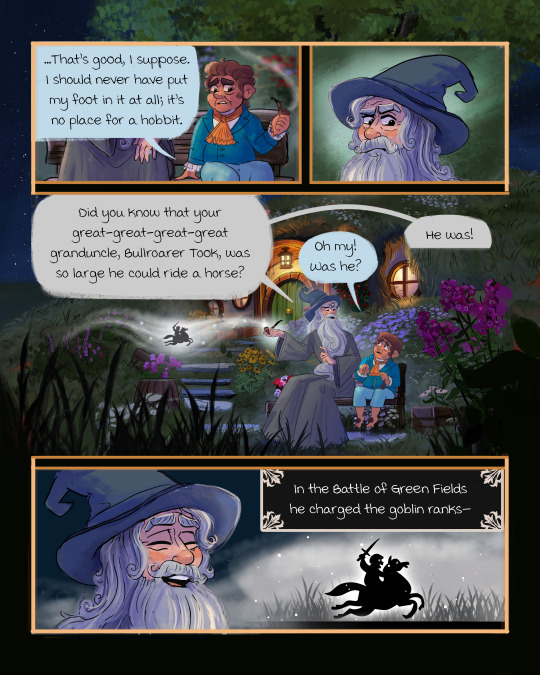
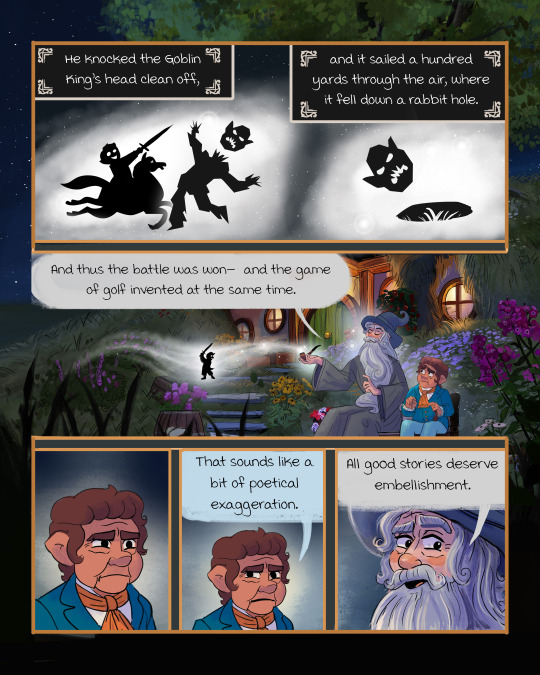
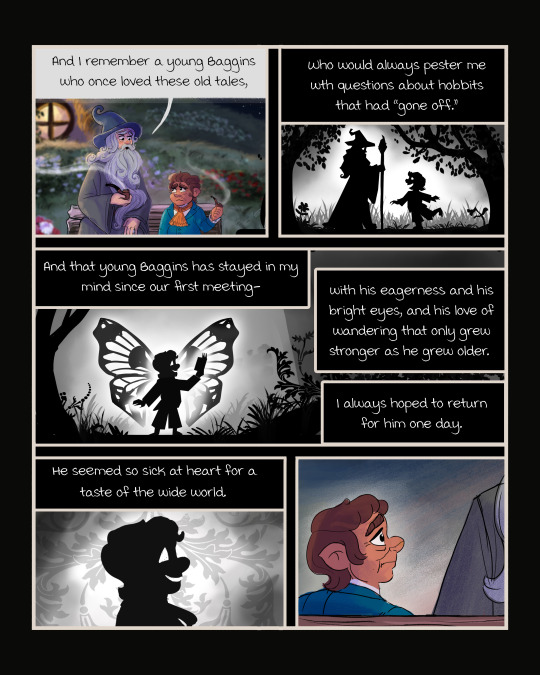
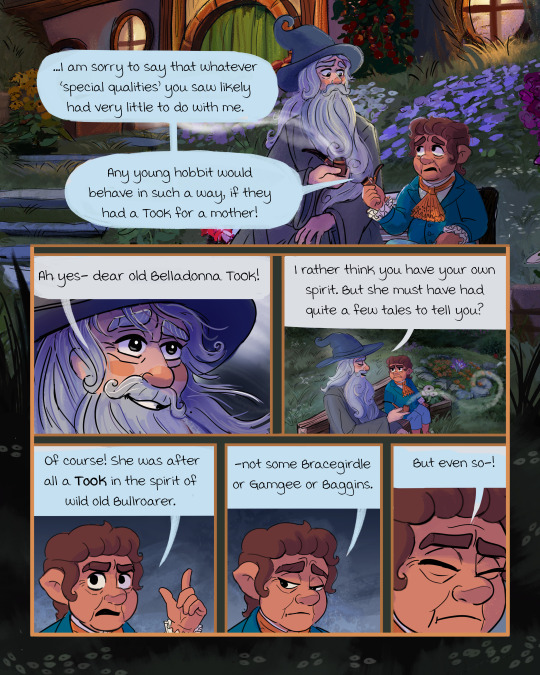
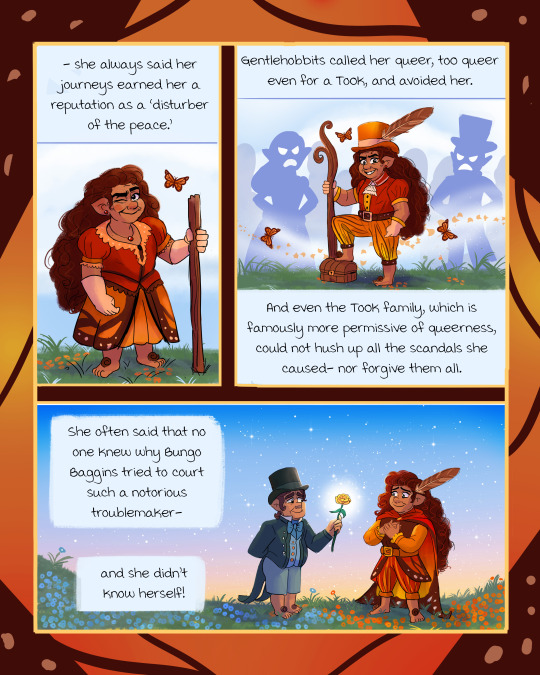
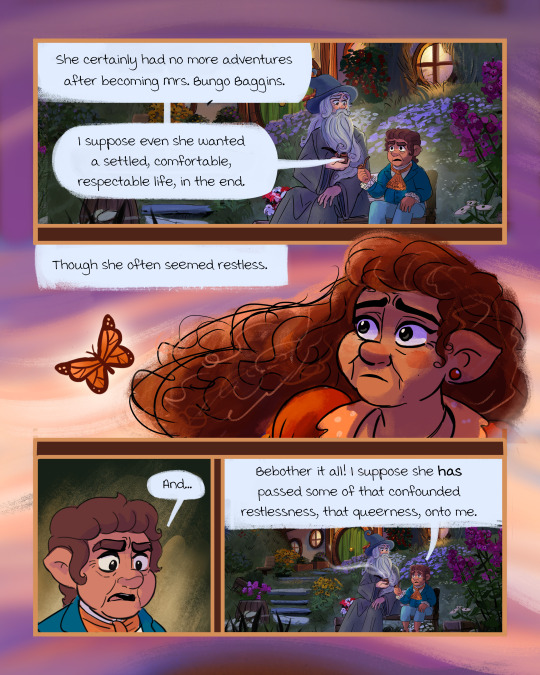
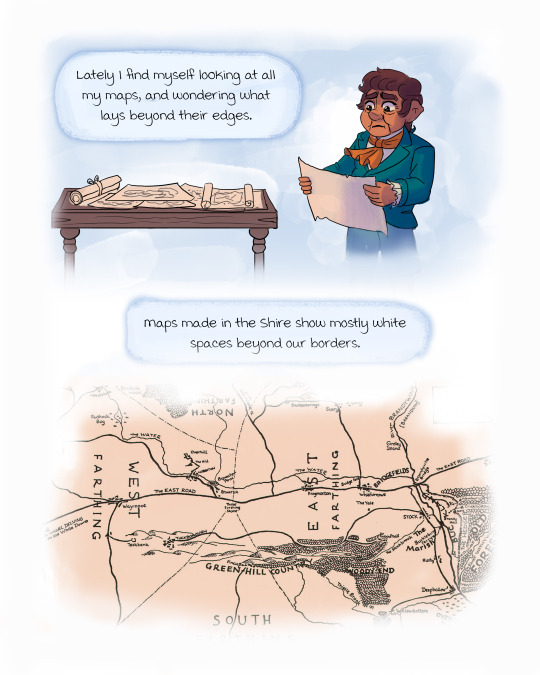
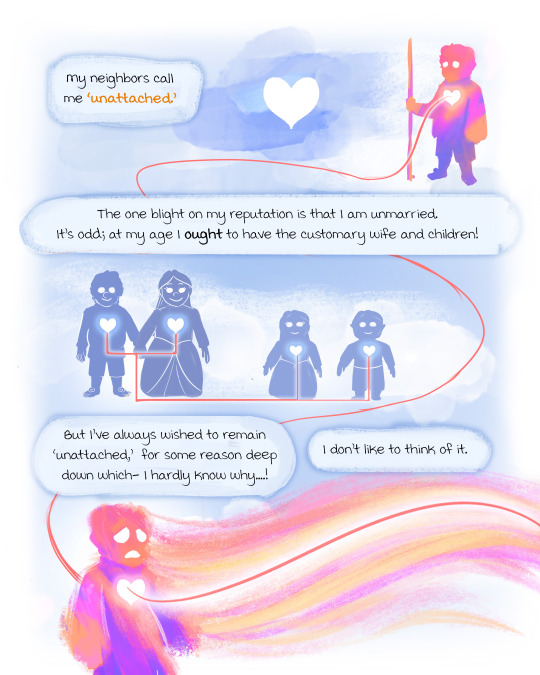
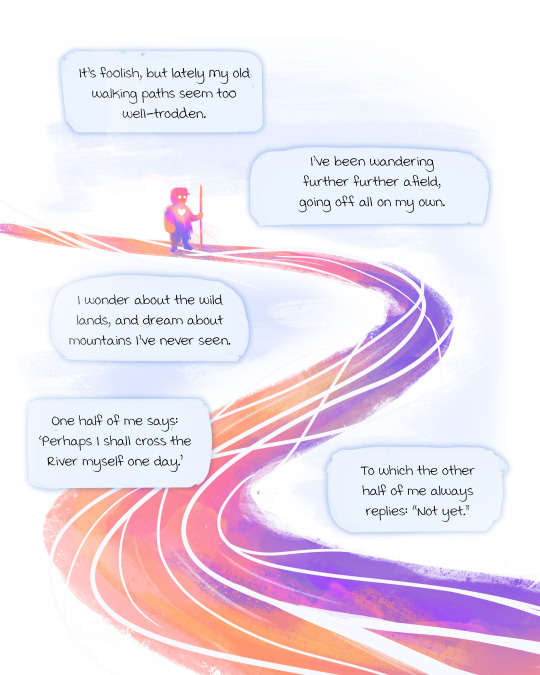
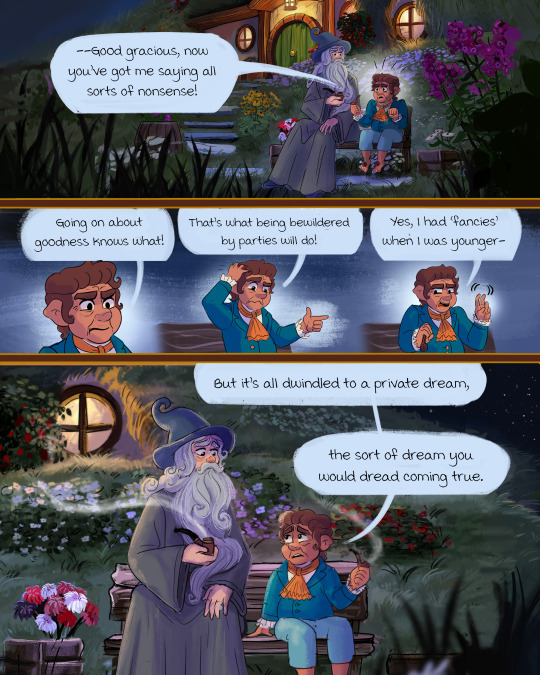
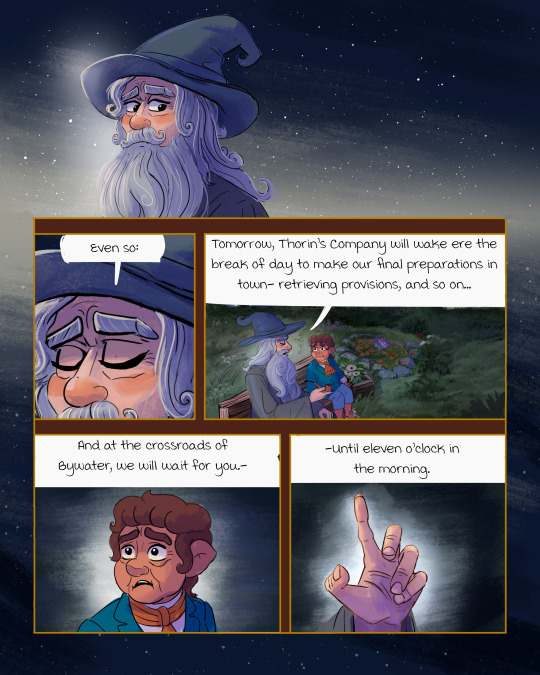
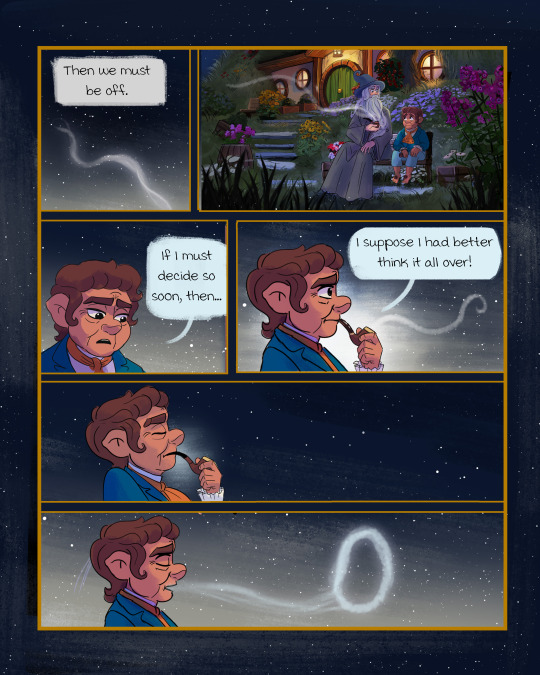
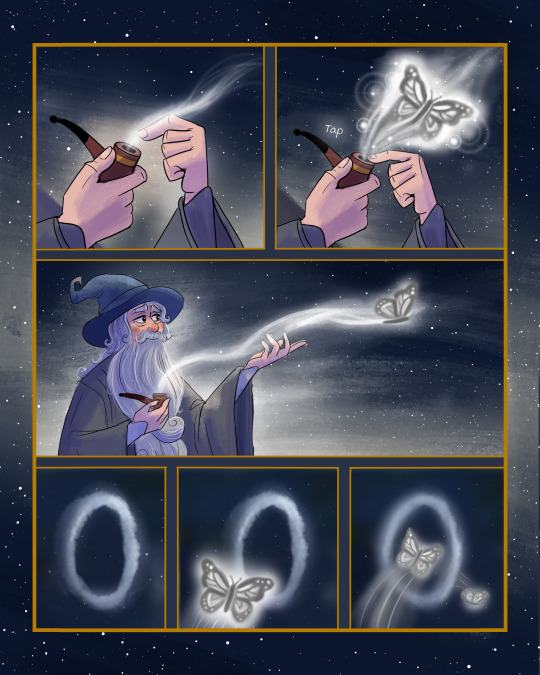
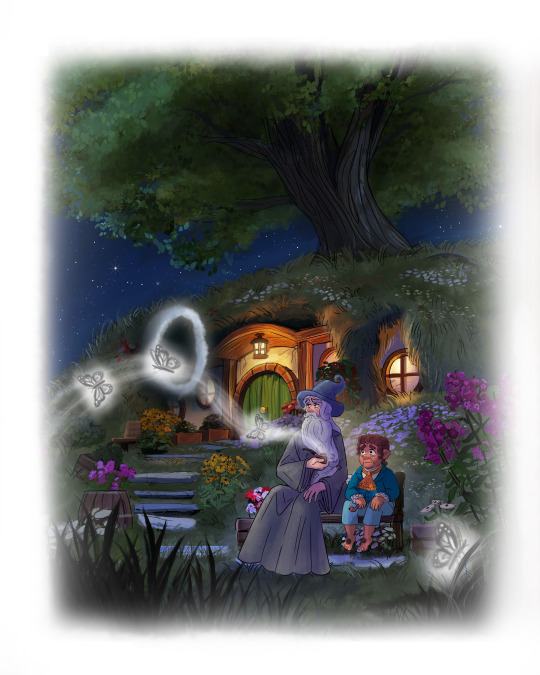
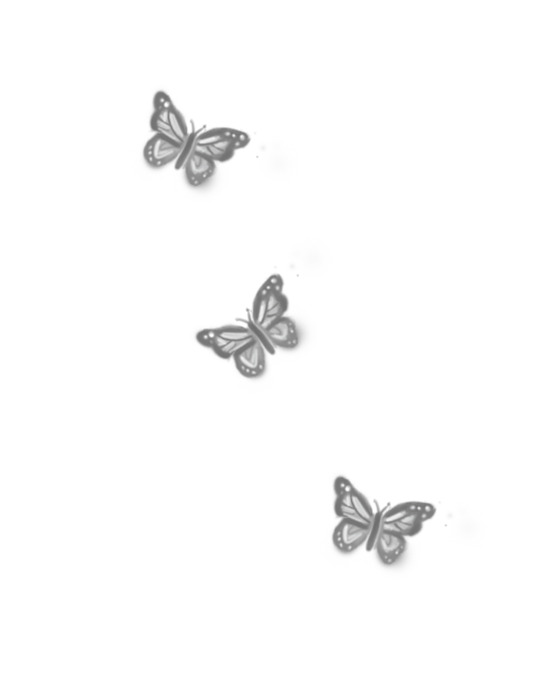
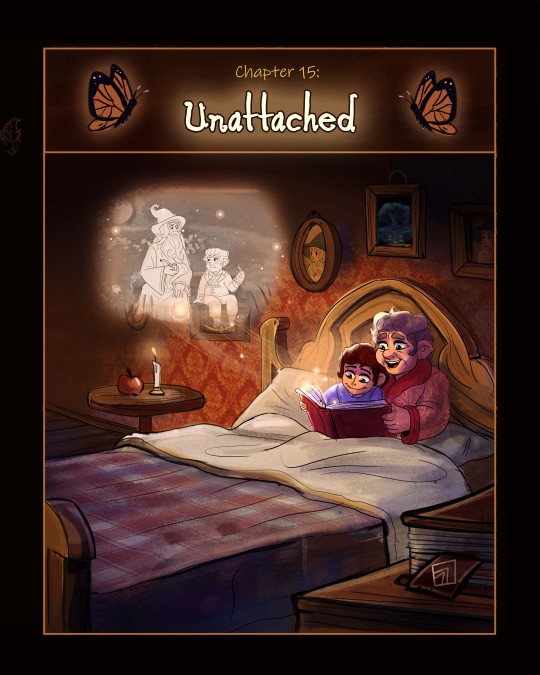
Retelling The Hobbit Chapter 15: Unattached First chapter / Previous / Next Read full comic on: Webtoon/A03
Other blogs : Instagram/Tumblr Sideblog
Thank you for reading! The next chapter of this comic adaptation of The Hobbit will be titled (drumroll)....The Song of the Lonely Mountain!
Check under the cut for notes on the callbacks to previous chapters of this comic, and to Tolkien stories like the Unfinished Tales! —-
—-
One of my guiding ideas for this comic is that the story is being written/drawn by Bilbo Baggins, an “unreliable narrator,” who has a biased way of recounting events. As the comic goes on, parts of the story get retold through new perspectives (or through the eyes of other characters), and you realize the initial version you read was incomplete.
A lot of you probably noticed that this chapter features a ton of callbacks to the earliest chapters of this comic! We saw child Bilbo and Gandalf's friendship told from Bilbo's POV in Chapter 3.....but in this chapter we see it retold from Gandalf's POV. However, Belladonna Took is our biggest instance of that! Not to overexplain my own writing, but Chapter 1 is an older Bilbo painting an idealized happily-ever-after fairytale picture of Belladonna, while Chapter 15 features a younger Bilbo telling a far less optimistic version of her life. While there's truth to both of them, neither of them is the full truth.
In the Fellowship of the Ring, Bilbo tells Frodo that ‘books need to have good endings,' like endings where everyone "lives happily ever after." If I were to continue this comic to the end of the novel, Bilbo’s habit of “rewriting things to be happier" would become a whole Thing.
Second: Much of this chapter is taken directly from “The Unfinished Tales: The Quest For Erebor.” That story was Tolkien’s attempt to unite the tone of The Hobbit with LOTR, by having Gandalf explain what The Hobbit looked like from *his* perspective. The gay line about Bilbo feeling incapable of settling down into a Traditional Marriage with a Wife And Kids is taken almost directly from the Unfinished Tales. So are all the lines where Gandalf reflects on what Bilbo was like as a child, and the moment where Bilbo reflects that all of his desire for adventure has dwindled to a private dream.
Third: Obviously, the other big influence on this chapter (outside the original novel) was a similar scene in the PJ film. The little bit where Gandalf reveals the lore behind Bullroarer took monologue is the only dialogue I’ve directly lifted from that scene. ;3
Fourth: some of you may have caught that I used a quote describing Frodo’s wanderlust in the Fellowship of the Ring to describe Bilbo. The bit describing "the maps that only show white spaces beyond their borders" is also why I emphasized Bilbo’s canonical nerdiness around maps in earlier chapters (chapter 5 especially, but also in Chapter 6, Chapter 7, and a blink-and-you-miss-it moment in chapter 14.)
Fifth: one of my favorite things in the original book are all the scenes where Gandalf does fun Whimsical things with smoke/smoke rings. In the book he usually makes them change color or race around; in my comic he usually makes them turn into butterflies (he also does this in chapters 3 and 11.) you may have noticed that Butterfly Symbolism is a big thing in this comic. But yeah, in another callback: Gandalf finally had time to blow smoke-rings with Bilbo, which he said he 'had no time for' in Chapter 2!
Thanks again for reading! I tentatively plan for the next chapter to arrive on November 13th.
#the hobbit#lotr#lord of the rings#the hobbit comic#retelling the hobbit#chapter 15#bilbo baggins#belladonna took#gandalf the grey#YEEEEEEEEEEEET#anyways#thanks again for reading!!!#long post
871 notes
·
View notes
Text
So desolate were those places and so deep the horror that lay on them that some of the host were unmanned, and they could neither walk nor ride further north. Aragorn looked at them, and there was pity in his eyes rather than wrath...
- thinking about how in his wwi service tolkien probably heard of or personally witnessed shellshocked soldiers being court martialled & even executed for desertion when their trauma disabled them. in his stories he gives them the mercy they were denied in life.
220 notes
·
View notes
Text
Love, empathy, and Hollywood: no romance in ‘The Rings of Power’
It's amazing how The Rings of Power writers have a moral compass in place, and how, to make the story more ‘Hollywood’ than it already is, many viewers (mostly from the Tolkien fandom) see it as a love story between Sauron and Galadriel.
From the beginning, we are shown that there is no love between them. Neither the kind that arises from sympathy and common interests nor the kind that is born from a common occupation or from the fever connected with the circumstances in which the heroes find themselves – a battle, the need to save themselves, a pursuit – nor from hatred.
Galadriel and Sauron are not friends, not usual enemies, not comrades. Yes, there is a glimmer of friendship between them when they go to fight for the southern lands, but on Sauron's part it is nothing more than part of the image of Halbrand – either a trickster, or a criminal suffering from a difficult past, or a king.
Sauron uses all three of these images at once, because he does not understand elves and men, and does not know which of the images will work. Therefore, he alternates them and keeps everything ready. But none of them is a true reflection of his feelings – it is a mask, a garment that he wears to make it easier to gain trust, charm, and seduce.
Later it will become clear that Halbrand is his unloved image. He is too open, familiar, simple. Too romantic. In the finale of the second season, showing Galadriel Halbrand in armor, Sauron mocks this image.
Halbrand from his illusion is beautiful. Breathtaking. But on the other hand – too beautiful, too refined, too romantic.
Sauron seems to say to Galadriel: look, for your sake, I am even ready to portray this brat. Sauron himself is closer to the image of Annatar – grandiose and demonstratively merciful. But here's the thing.
Galadriel doesn't fully believe any of these images. If she did, she wouldn't seek information about the king of the southern lands. She suspects that he plays with her. When she and Halbrand sit alone in the forest, she feels for a moment how it could be, but not how it is. By the way, not only because deep down she doesn't trust Halbrand, but also because she knows something that Sauron cannot know – because he does not understand the elves and their feelings. Galadriel cannot fall in love now, because she is burned out from within. Her pursuit of Sauron is partly an attempt to sweep out all the ashes and cinders of old pain and past battles. But Sauron is a narcissist and a psychopath. Narcissists and psychopaths perceive any weakness as an opportunity, and any kind look as admiration and love. Therefore, he is probably sure that Galadriel will still be with him in the end.
That's why her refusal in the finale comes as such a shock to him. How so? He did everything right. He thought it all through. He gave her everything she wanted. He doesn't even take the ring away, he asks for it. What else does she need?
Charlie Vickers plays him amazingly. And you can tell he's playing what's written. A cold, inhumanly scary, alien demon.
The show's writers deliberately spent half of the first episode of the second season showing what he is. What he's become. What he's made of himself. I remember being so shocked by it that I even forgot the second half of the episode. I rewatched it as if it were brand new for me.
Sauron, ‘getting into’ the image of Halbrand, learns human facial expressions. For half of the episode, his face is completely motionless. And not ‘frozen’ motionless, like a person who has withdrawn into themselves or does not experience strong emotions, but like a dead one. I don't know how Charlie Vickers did it. Dead bodies not only have no facial expressions – they have no faces. The face of a dead person is a set of features, like separate pieces of paper folded together. Sauron looks exactly like this at first. And only later, after spending some time among people, he adopts their habits, gestures, and facial expressions. And among the elves, even this turns out to be unnecessary – it is enough to walk beautifully, smile and look condescendingly.
There is no feeling between Galadriel and Sauron because Sauron has nothing with which to feel. He has no emotional empathy, so he does not understand what Galadriel feels. That is why he shows her Finrod at the end of the first season. It is unthinkable, unbearable cruelty. He does not even understand it. And he cannot imagine that the woman to whom he offered the crown and the whole world to its knees would refuse him. Because he has no intellectual empathy either, and he does not understand that different creatures need different things.
What I like about the Galadriel and Sauron storyline is that the authors show it in different ways and from different points of view – it's impossible. It may look like falling in love, Sauron may act like a handsome prince, but it will never work. And Sauron knows it – that's why he hits her with the crown at the end.
And paradoxically, it finally sobers her up. Galadriel is completely different in the finale. With his hit, Sauron knocked out of her the last of her pain, anger, self-pity, and darkness. He didn't want to, but he knocked it out. And now she sees the light as never before.
Isn't this a victory of love?

86 notes
·
View notes
Note
Sorry I'm sure you've got a lot of questions about your post but please tell me how the publishers reacted to your explanation that the Elrond porn they thought you plagiarized was actually yours
OK I'm just going to answer this one and keep it pinned because I've got a good 6 people in my inbox all asking the same question and I refuse to explain this 6 times 😭😭😭
Tbh the biggest hurdle was not the "twas I that wrote the filth" bit, it was actually convincing them (they were all rather old) that I was not actually writing smut about Hugo Weaving, which if you think implies they genuinely assumed I was writing smut about the actor Hugo Weaving, whom I have never seen in anything except LotR and that one film where he flounces about in a frock, then you would be correct. May be partially my fault though because from what I remember, I replied to a reviewer with an A/N that said I really liked film Elrond but his hair sometimes made him look like a catholic schoolgirl, which they may have... misinterpreted I guess? 😭
So mainly I just had to convince them that I did not have a kink for that poor man, that the smut in question was written about two elves aka mythical creatures, that Hugo Weaving is not actually an elf, and that neither Elrond nor Lindir are real and thus cannot actually sue them.
They then asked me if there was any chance Hugo might sue them had the fics been discovered post publication, and thankfully, considering that man's entire attitude is "jesus fuck guys stop yapping about that goddamn elf he wasn't even that great" bless him, I could confidently say that he would be the last member of the LOTR cast to give a singular fuck about someone writing Tolkien smut, probably because he's put the word "elrond" on his perpetual block list.
But other than that it was all pretty normal, they just looked very surprised and obviously asked me to delete the profile but all in all iirc it went better than expected, except my poor agent, who was sitting there turning multiple colours of humiliation (sorry again V).
#Asks#Why the FUCK did my shitpost blow up a week into rejoining Tumblr#Truly I am the walking embodiment of Murphy's Law#Writing#Crack but it's my life
56 notes
·
View notes
Note
I was just thinking about requesting head canons about the bachelor's with a reader who speaks another language (and honestly, my personal headcanon is that elvish sound like gaeilge/Irish) and the Zevlor headcanon that was just posted convinced me to send it. So here it is. What do the boys think of a partner that speaks another, non common, language?
Hi Wisteria! I'm always happy to see another request from you :)
Personally I love hearing fantasy languages, Tolkien's elvish and it's portrayal in LOTR come to mind. That was definitely something on my mind while writing this, and even if I didn't specify I definitely wrote this with the idea of the reader speaking some form of elvish or celestial in mind. For anyone wondering, the Zevlor headcanon mentioned in the ask would be the 'accidental turn ons for the bachelors' <3
The bachelors with a partner that speaks another language
Dammon
So, I feel like all the tieflings have at least a basic understanding of infernal, Dammon included
He loves calling you by pet names and endearments in infernal
The day you do the same but in a non-common language is the day this man simply passes away from happiness
He completely paused the first time he hears it, before teasingly asking what else you're hiding from him
Dammon loves hearing you speaking another language casually, just like how he speaks bits and pieces of infernal
Over time he starts to pick up on translations of the things you say and will sometimes respond in infernal as a joke
Other people get very confused when they see you two speaking completely different languages to each other, especially if he explains neither of you actually know the other language
Dammon does it specifically to confuse people, sometimes he also says it's a special language for you two
He loves listening to you and could happily do it for hours
Zevlor
Not going to beat around the bush, Zevlor is extremely turned on every time he hears you speak another language
It just fuels something in him, he doesn't even really know the specifics, just that he finds it incredibly attractive
You can tell his full undivided attention is on you every time you're speaking something other than common
If you really want to tease him, lean in behind him and murmur something in his ear
His breath audibly hitches and his whole body does a system reboot right in front of you
Zevlor will absolutely encourage you to speak in another language around him, and picks up on translations quite easily
You'll even hear him saying the occasional word in the language too, the little smile he gives you afterwards is just too sweet
Over time he calms down a bit more, but hearing you never quite loses it's spark
It's always something Zevlor is going to be drawn to
Rolan
Rolan drops something the first time he hears you speaking a different language, it's probably a book that finds itself on the floor
I feel like he'd be pretty fluent in infernal, this man is incredibly smart and is always learning
He's shocked and intrigued when you speak a second language though
As much as he doesn't want to admit it at first, he'd love for you to teach him how to speak the language
In return he'd happily teach you infernal, and Rolans actually a very good teacher
In the end I can see him having some sort of schedule so you can both learn the new language
He insists on learning through exposure too, so common ends up becoming a rarely spoken language between you both
Cal and Lia have a ball of a time teasing you both, in return Rolan will talk to you only in a language they don't understand while around them
He really loves getting to hear you talk in another language, and hearing you teach it is even better
#bri answers#baldurs gate 3#bg3#baldurs gate 3 x reader#bg3 x reader#baldurs gate 3 dammon#bg3 dammon#dammon x reader#baldurs gate 3 zevlor#bg3 zevlor#zevlor x reader#baldurs gate 3 rolan#bg3 rolan#rolan x reader
272 notes
·
View notes
Text
Book Sauron vs. Movie Sauron
(and why people complain about Rings of Power's portrayal of the character. In my opinion). Nerd rant I guess.
I think a big reason why a some viewers are unhappy with RoP Sauron is that there is a big discrepancy between Sauron in the books, and Sauron in the Peter Jackson trilogy. And most people have probably only seen the movies (which is fine, I am not a book purist and I have personally only read 1.5 of the books, and tbh I found them pretty boring.)
But anyway:
In the films, Sauron is an entity. He can’t take physical form. He is evil incarnate, a nameless fear, a flaming eye etc. Whereas in the books, Sauron is way more of a person and actual character.
We only hear stuff about him from other people, but he does have a physical form. Sauron personally tortured Gollum, and Gollum was later able to describe his appearance to Gandalf, saying that he was missing some fingers on one hand from when Isildur defeated him. We also learn from Eomer that Sauron had approached Rohan wanting to buy horses from them. Rohan refused, so Sauron just stole the horses instead - but his initial intention was to buy the animals fair and square, with normal human currency. At a "great price" according to Eomer.
Recently I also read that Sauron had apparently become somewhat fond of Shelob and jokingly referred to her as his cat lmao. That is mentioned in the Shelob chapter in The Two Towers. Just little things like that make a huge difference. I cannot imagine movie!Sauron making jokes like that.
Mordor is also different book to movie. In the books, there are some farmlands in the Southern parts of Mordor, which makes sense because orcs do need food obviously. Return of The King says this:
"Neither he nor Frodo knew anything of the great slave-worked fields away south in this wide realm, beyond the fumes of the Mountain by the dark sad waters of Lake Nurnen; nor of the great roads that ran away east and south to tributary lands, from which the soldiers of the Tower brought long waggon-trains of goods and booty and fresh slaves. Here in the northward regions were the mines and forges.”
In Tolkien’s own illustrations, Mordor also looks a little bit more normal.
All that to say: if your idea of Sauron is an evil-incarnate entity who has no physical form and only talks in raspy, wheezing Black Speech, then yes, it is probably very grating to see Charlie Vickers running around with hair bows and pretty little ringlets falling in his face, being sarcastic, flirting with elf-maidens etc. But I personally don't think there is anything inherently un-Tolkien about it. Despite Tolkien's vocal dislike of allegory, Sauron is a pretty obvious allegory for the devil/Lucifer - he is quite literally a fallen angel taking on various forms to tempt and charm people into doing his bidding. I think the true evil-incarnate character is Morgoth. Sauron is more likely to weight his options and try for a diplomatic solution before throwing all his resources into waging war on people.
45 notes
·
View notes
Text
Bold prediction for ROP season 2 : Galadriel won't kiss anyone. At least, not romantically.
Morfydd didn't say that her character was at the other end of the kiss, did she? She may have referred to a kiss that Galadriel witnesses. Maybe it will be two Uruks kissing for all we know; that would be surprising enough for the audience !
I know so called "leaks" claim that Galadriel kisses someone who's not Celeborn, but there are so many haters out there who will tell anything to discredit the show, that I refuse to take these leaks as legit source of information.
I don't expect a Saurondriel kiss tbh, neither in a vision or "for real". I simply don't think they will go there. Imho they'll keep Galadriel and Sauron's relationship ambiguous, to allow shippers to keep on shipping without antagonizing the Tolkien lore-bros and the antis too much. I won't complain if I'm wrong but I refuse to hold my hopes up on this point...
Galadriel kissing Adar, especially to make Sauron jealous, would be totally OOC imho.
They won't make Elrond and Galadriel romantic, I'm sure of that. Since the beginning they are like brother and sister, and Elrond will later marry Galadriel's daughter... Making him simp for Galadriel would be VERY weird. It's probably him that we see caress Galadriel's face (or it's a red herring and it's in fact Sauron dressed as Halbrand in his Eregion outfit.....), but it doesn't have to be a romantic gesture !
The only scenario I can envision is a hand kiss given by Adar or Sauron. Or a kiss of friendship on the cheek or the forehead.
But a romantic kiss? Sorry, nah.
#the rings of power#Galadriel#Elrond#That rumoured kiss#Trop season 2#Sauron#Halbrand#Adar#morfydd clark#rop#rings of power
58 notes
·
View notes
Text
Parque Sur au boom 💥💥
(aka if south park was set in spain lmao)
Pip is from Cataluña i dont make the rules
Kenny from Murcia bc those guys cannot be understood and neither can he
And Craig either Peruvian or from Canarias idk
Ze Mole can still be french but they'd bully him So Hard lmao 😭
Canada is either Andorra (destino de pelicula sthsth) or Portugal :3
Anyway Parque Sur is at either the north of spain (galicia or asturias) bc its colder there so they can keep their wintery aesthetic
Or at andalicia cuz its at the actual south lmao
Kyle might be muslim instead of Jewish cuz cartman would bully him harder
(spain ignore judaism but not moros smh)
Tweek would work at a chino shop
Chinese or not idgaf he works at a chino i dont make the rules
Also i see Clyde's skin being sliiightly darker than everyone else's (like literally almost unnoticeable) and everyone calls him negro cuz of that (tolkien is right there they dgaf clyde is the black guy 😔✨)
Anygays Parque Sur would totally have a quijote episode
And their going native would be going to canarias<3
Therefore Craig is probably def peruvian lmao
David is gringo and his name is pronounced the way cartman does in canon btw
But now cartman calls him daveed XD
Kyle isnt from jersey hes from madrid :3
Rip madrid but also fuck those guys
Idk man itd be very silly :3
If any spanish ppl wanna contribute be my guests lmfao
#i said i wasnt gonna make one of these but anyway...-#south park#south park fandom#south park au#south park hcs#south park headcanons#south park fanfiction#parque sur au#my au
19 notes
·
View notes
Text
I Read The Silmarillion So You Don't Have To, Part One
This is really for the benefit of my mother and sister, who are both diehard Lord of the Rings fans, but who don’t want to read The Silmarillion. My mother remembers picking it up with the expectation that it was another LotR book, and being disappointed that it read more like a history textbook than an actual novel. That’s because it’s not a novel, it’s a mythological epic along the same lines as the Homeric epics or the Epic of Gilgamesh, that tells the history of the first age of Tolkien’s world. It occurred to me that I am exactly the type of person Tolkien wrote The Silmarillion for — a person who knows folklore well enough to appreciate what he was trying to do, and recognize the conventions that he uses. I’m a person who went and applied to Yale’s graduate program in medieval studies (and got in!) just so that I could use the historical, cultural, and literary background of the Middle Ages to inform my own fiction. So, forgive me for saying it, but who’s better equipped to appreciate The Silmarillion than me? And it’s not as long as I thought, with only about 400 pages, which feels really doable after having read Jonathan Strange and Mr. Norrell. So, I’m going to paraphrase the whole of The Silmarillion, for all those who want all the juicy Tolkien lore but don’t want to read it themselves.
Before I get into it, here’s a bit of background, for those less versed in Tolkien lore: The Silmarillion is Tolkien’s magnum opus, which he spent his entire life working on and never properly finished. It could be called a “prequel” to The Lord of the Rings, but that would be misleading. It’s intended to be an original mythology for England, from before recorded history. The Hobbit and The Lord of the Rings are both small episodes from this enormous mythological cycle, and neither is really all that significant in the overall story of Tolkien’s world (which is probably why they actually got finished, and published). The Silmarillion and The Hobbit were originally meant to be completely separate projects, which is why they differ so much stylistically, but Tolkien eventually decided to combine them into the same world. The Lord of the Rings fully integrates the world of The Hobbit and that of The Silmarillion, with copious callbacks to both. (The reason Tolkien wrote it at all is because his publisher wanted a Hobbit sequel and not whatever weird thing The Silmarillion was.) The Silmarillion was not actually published until after Tolkien’s death (because he was never ready to officially declare it finished), and it was edited together by his son Christopher.
Christopher had to do a lot of reworking in order to make the narratives more fluid and consistent with everything Tolkien had written about the world. In that way, The Silmarllion kind of does resemble the ancient epics that it emulates — it’s cobbled together out of its existing material, with many pieces missing or compensated for. Christopher writes,
It became clear to me that to attempt to present, within the covers of a single book, the diversity of the materials — to show The Silmarillion as in truth a continuing and evolving creation extending over more than half a century — would in fact lead only to the confusion and the submerging of what is essential.
Like any mythology, The Silmarillion is fundamentally organic, so what Christopher did is the equivalent of taking a bunch of Ancient Greek primary sources and cobbling them together into something like Ovid’s Metamorphoses: A coherent narrative that arranges all the basic stories from the mythology in chronological order, making it much more comprehensible, but also stripping away all of its inconsistency and nuance. That actually makes it more authentic. The fact that one person was able to produce anything close to the complexity of an entire oral tradition is extraordinary.
I’m not going in blind. I have a general idea of what The Silmarillion is about, and I’m familiar with general Tolkien lore through osmosis (mostly thanks to Quora). I’m interested to see if my initial impressions hold up, how much of what I know about wider Tolkien lore actually comes from this book. I know the Fall of Numenor’s in it. Is Beren and Luthien’s whole romance in it, or is that only in the Unfinished Tales? What about Elendil and the formation of the half-elven line that would eventually end with Aragorn? What about Annatar? I guess I’ll find out.
Ainulindalë: The Music of the Ainur In which Melkor learns that it’s really disrespectful to deliberately sing the wrong thing during a choral concert.
In the beginning there was God, whom Tolkien calls Eru or Ilúvatar. Ilúvatar creates beings called the Ainur, which are sort of like gods and sort of like angels, and tells them to sing for him. Initially, each Ainu only comprehends the part of Ilúvatar that it represents, but eventually they start to understand each other, and gradually they start to understand Ilúvatar’s big vision of the universe. They start to harmonize, and their singing creates the world. I’m only a few paragraphs in, and it’s already so beautiful I could cry.
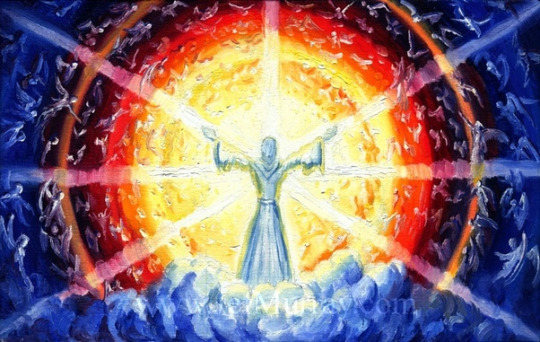
The Music of the Ainur by Jef Murray
The first thing I’m reminded of is the Platonic (and Kabbalistic) idea of emanation — God creates higher beings that are manifestations of his thoughts, and then the higher beings create the physical world, which is a manifestation of their thoughts. Magic in general follows this same pattern of manifesting one’s ideas in physical reality. There’s so much more I could say about that, but this is meant to be a summary and not a theological dissertation. I’m betting it’s not a coincidence, though.
The Ainur are made of Ilúvatar’s ideas, and all of them express Ilúvatar’s ideas through their singing. But — oh no! — one of the Ainur comes up with some ideas of his own, and decides to sing about his own ideas in order to glorify himself. If you hadn’t guessed already, Melkor is this universe’s Satan. Just like Lucifer, Melkor is one of the most powerful and glorious of the Ainur, and he’s a Special-Chosen-One-Magical-Girl because he has a little bit of each of the other Ainur’s powers (i.e. he shares in all of their divine domains). Melkor introduces some discordant notes into his singing, which introduces imperfection to the universe.

Ainulindalë by Paontaur
Most of the Ainur who are in Melkor’s choral section are like, “who the hell is singing off-key?” But some of them like his melody better than Ilúvatar’s, and start singing along with him. This makes matters worse. Ilúvatar simply smiles and starts conducting a new song that’s similar to the first one, but a little different, to accommodate the discordant notes. Melkor and his choir start singing louder in response, and the entire universe becomes the equivalent of a gorgeous violin concerto and a heavy metal riff playing at the same time, each at full volume. To get an idea of what this might sound like, I listened to “The Cloud Atlas Sextet” and the guitar solo from “Seven Nation Army” at the same time, and… it kinda worked, in a weird way, but it definitely sounded like the two songs were competing with each other. Not easy to endure for long, so, a good portion of the Ainur stop singing.
Ilúvatar lifts his other hand, and another song starts up, interweaving with the first. One is slow and sorrowful, the other is loud and abrasive, and together they drown out Melkor’s evil guitar riff. Raising both hands, Ilúvatar ends the music in a single chord that is deeper than the abyss and higher than the sky.
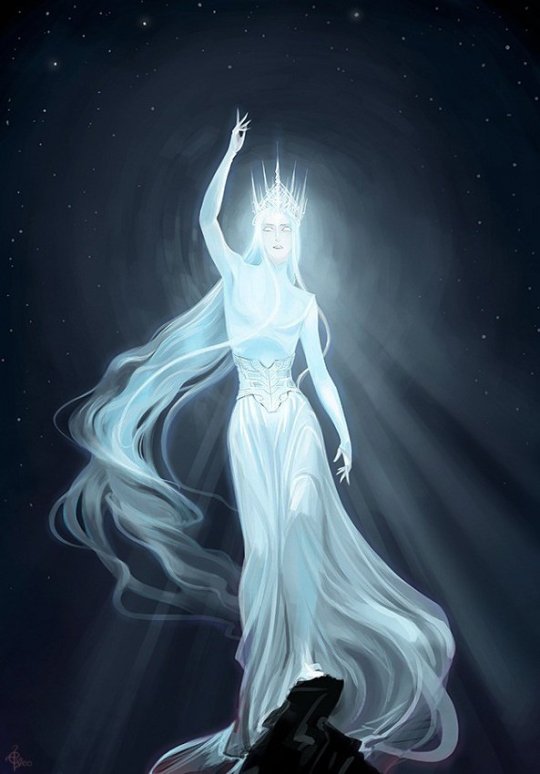
Eru Ilúvatar by Elveo
Ilúvatar addresses the Ainur, telling them that they will now see the things that were created with their music. To Melkor, he says, “If you try to change my music, you’ll find that you’ve actually made my music even better in ways that you can’t even conceive of. Everything you do is going to serve me anyway, so go ahead and try!” So, we get an answer to the Problem of Evil right off the bat. Discord is allowed to exist because, in a roundabout way, it improves the things around it. Every story needs a villain to be interesting, and Melkor is the villain of the story that Ilúvatar is telling.
Melkor feels ashamed, and then resentful. Ilúvatar gives the Ainur the ability to see (when before they were only able to hear), and shows them a vision of the world they made with their singing: Arda. Each recognizes the part of Arda that it personally sang into existence. They see some of the past, present, and future, and they also see things that they hadn’t conceived of. One of these things is a vision of the “Children of Ilúvatar,” the races of Elves and Men. Ilúvatar brought them into existence with the third song (the bombastic-sounding one), and the Ainur didn’t have any part in creating them. Most of the Ainur immediately love the people, and understand more of the mind of Ilúvatar through watching them.
Melkor and his followers, most of which are the most mighty of the Ainur, focus all their attention on Arda (as opposed to anything else in the universe). Melkor convinces himself that his goal is to help the Children of Ilúvatar in by putting the world in order, but yeah… sure, buddy. His real goal is to subdue all the Children of Ilúvatar to his own will instead of that of Ilúvatar.
The rest of the Ainur are very impressed by Arda, and especially by the sea, which contains the distant echo of the Music (which is why all the Children of Ilúvatar feel called by it). The Ainur that sang the water into being is called Ulmo (no, not Elmo), and of all the Ainur, Ilúvatar taught him the most about music. Each of the other Ainur was given a different concept to comprehend and sing into existence. The air and wind was created by Manwë, who is the noblest of the Ainu. The earth was created by Aulë, who’s almost as skilled as Melkor, but his sense of pride is in making beautiful things, instead of in himself.
Ilúvatar shows Ulmo that, although Melkor tried his best to destroy the idea of Water through his singing, all he did was make it even cooler in the manifest world. Melkor created Cold to freeze the water, but all that did was create beautiful snowflakes and whirls of frost, which Ulmo never even conceived of. Melkor created Heat to evaporate the water, but all that did was create the beautiful clouds and the music of rain falling. The clouds have the double benefit of bringing Ulmo closer to his friend Manwë (it probably says something about me that I read “thy friend, whom thou lovest” and immediately thought, SHIIIP!).
So, therefore, everything Melkor does to screw up Ilúvatar’s creation ends up improving it in the long run, and that’s why Ilúvatar allows Melkor to exist.
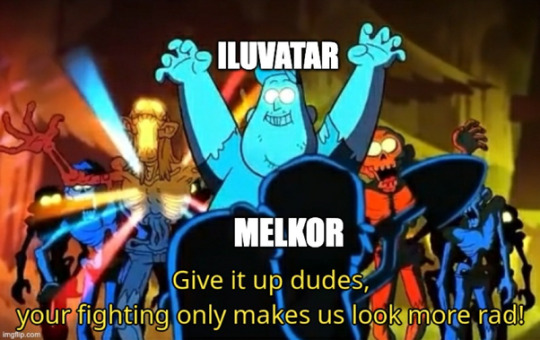
Arda does not actually exist yet, it only exists as an idea that has been described in the singing. So, Ilúvatar formally begins the manifestation of Arda with an epic Let There Be Light moment: “Eä! Let these things Be!” A light appears, and the light is the whole of the universe.
Many of the Ainur choose to remain with Ilúvatar, but a certain number of them descended into the manifest universe, Eä. Making this choice requires them to give up a significant amount of their power and ability for as long as Eä exists. That’s what being alive and in the manifest world does — it shoves you down into a smaller version of yourself and limits the things that you can do. (The Wizards experience this same thing, but on an even smaller scale.) The Ainur that decided to go to Eä are called the Valar, and they function mostly like gods and goddesses.
The Valar are disappointed to discover that the world doesn’t actually exist yet. The singing just conceived of it as an idea, and Ilúvatar kickstarted its manifestation, but now the Valar have to actually build it. So, they begin to painstakingly shape the primordial matter of Eä into Arda, the world as we know it. Manwë, Ulmo, and Aulë do most of the work, but Melkor is there too. Melkor is that guy who doesn’t actually help with the group project, but then takes credit for the whole thing once it’s done. While the other three are building the world, he offers unhelpful suggestions and changes things to make it suit his own vision. When Arda is young and covered in fire, Melkor figuratively plants a little flag on it and names it Melkor-land. Manwë, who was the lead singer of the second melody that Ilúvatar created in response to Melkor, is really pissed off and brings a host of other spirits down to Arda to kick Melkor out. No one gets to claim credit for a group project that everyone else worked on! Melkor goes off into a corner to sulk, and leaves Arda alone… for the time being.
The rest of the Valar give themselves physical forms. Because they’re all excited for the arrival of the Children of Ilúvatar, they base their appearances on the Elves and Men. Their humanlike forms, gender, and so forth are about as inconsequential to them as our clothing is to us, and they don’t always bother to “wear” their humanoid forms. Melkor sees them walking around on Arda in these beautiful forms that emulate the people and the elements of the world itself, and is even more resentful than ever. So, he gives himself his own physical form, and because he’s motivated by spite, his form is dark and scary instead of bright and beautiful. He appears as something like an ice-capped volcano, all fire and ice, striding through the sea.
What follows is the first war between the Valar and Melkor. The Elves don’t know very much about this, so, little of it is recorded. What we know is that Melkor went around and petulantly undid whatever the Valar were trying to do, like your annoying sibling who keeps knocking down your tower of blocks every time you finish building it. Whatever the Valar tried to make, Melkor would destroy. If the Valar made a valley, Melkor inverted it into a mountain range. If they carved out an ocean, Melkor “spilled” it. Everything in the world is therefore corrupted or somehow altered by Melkor, instead of matching the Valar’s original idea for it, but in the end the group project is finished and it comes close enough.
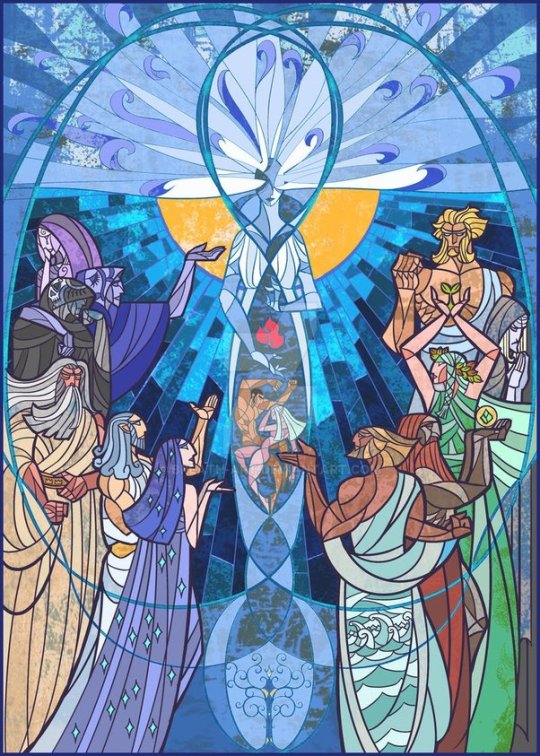
Music of Ainur by breath-art
Valaquenta: Account of the Valar and Maiar according to the lore of the Eldar In which we’re introduced to the T̶w̶e̶l̶v̶e̶ ̶O̶l̶y̶m̶p̶i̶a̶n̶s̶ Kings and Queens of the Valar, and the Maiar.
This is what every fantasy writer wishes they could do — just exposit on the lore of their gods! I wish I could explain all about my fictional gods and how cool they are at the start of my novels, but I’m not Tolkien. Maybe someday I’ll be famous enough that someone will buy a book like this one that consists of nothing but lore.
Now, imagine that you’re opening the D’Aulaires’ Book of Elven Myths, and reading about the great elven gods (or more specifically, the gods as the Elves know them).
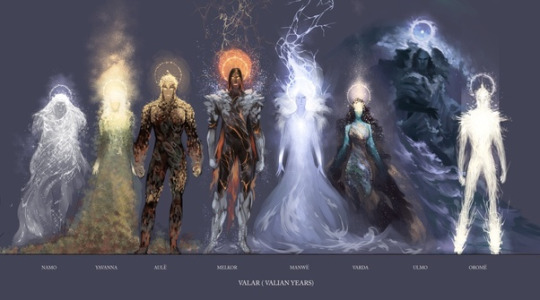
Valar by @phobso
As I usually do with pantheons of gods, allow me to introduce you to the pantheon of Arda! These are the Kings and Queens of the Valar, and there are seven of each:·
Manwë: The god of the sky and wind. He’s the High King of the Gods, just like Zeus. He has the epithet Súlimo, “breather.” Manwë sort of replaced Melkor as the Ainur who best understands Ilúvatar (making him roughly equivalent to the Archangel Michael, if Melkor is Satan).
Varda: The goddess of stars and light, Manwe’s wife. She lives with him in a tower on top of the tallest mountain (Taniquetil), and Being with each other improves their perception, so that they can see and hear everything. Varda hated Melkor before everyone else hated Melkor, and thought he was an asshole even before the Music was sung. The Elves call her Elbereth, and she’s their most important goddess.
Ulmo: The god of water, all water. He spends most of his time in the depths of the ocean, so he doesn’t see the rest of the Valar much and doesn’t bother to take on a human form most of the time. When he does, it is terrifying to see his gigantic form rise out of the waves and hear his voice, which is as deep as the ocean. Despite having disengaged from the other gods, he still loves the Elves and Men. He keeps tabs on them through all the freshwater rivers, lakes, springs, and fountains. Sometimes he wanders on shore in disguise and plays horns made of white shells, which fill whoever hears them with a longing for the sea (like Legolas).
Aulë: The god of rock and metal, precious stones, mountains, smithing, craftsmanship, and terrain. Aulë is the most similar to Melkor in temperament, because both wanted to make things of their own and have others praise them for it. It was mostly Aulë’s job to fix whatever Melkor broke during the creation of Arda, so he hates Melkor as much as anyone else. Melkor, meanwhile, lost his ability to create anything of his own — he can only corrupt or destroy things that others have made, so he especially envies Aulë.
Yavanna: The goddess of nature and agriculture, Aulë’s wife. She usually appears as a woman in a green dress, but sometimes she appears as a Tree of Life who connects the groundwater with the sky. She has the epithet Kementári, “queen of the earth.”
The Fëanturi: The masters of spirits, two brothers who rule over Death and Sleep. They’re called Mandos and Lorién, but these aren’t their actual names—they’re the names of the places they live. Their actual names are Námo and Irmo. (I’m not really sure why they were introduced to us by the names of their domains, but linguistics is weird, and Tolkien fully replicated its weirdness.)
Namó/Mandos: The god of the dead, who lives in the Halls of Mandos, in the far west of Valinor He forgets nothing, knows everything, and knows the fates of everyone. It’s his job to pass judgement upon the beings that live in Arda after they die (or… whatever the elves have instead of death? A sort of purgatory), and he works under Manwë’s authority.
Irmo/Lórien: is the god of dreams, who lives in the gardens of Lórien (now you know where the name “Lothlórien” comes from). The Valar often take breaks in the heavenly world of Lórien whenever Arda becomes too much from them.
Vairë: “The Weaver,” the goddess of history, who records all of time in her webs. She’s Namó���s wife, and lives in Mandos with him.
Estë: The goddess of sleep and healing. Like her husband, she is gentle, refreshing, and not at all like Morpheus.
Nienna: The goddess of sorrow and grief. She mourns incessantly for everything Melkor has ever done, and everything that was hurt or lost as a result. On the slightly brighter side, she’s also the goddess of compassion and hope. She lives even further west than Mandos, and the spirits trapped in Mandos supplicate her for her wisdom. She is Namó and Irmo’s sister.
Tulkas: The god of strength and heroism, who came to Arda specifically to help the other Valar fight Melkor. His epithet is Astaldo, “the valiant.” He has long golden hair and a golden beard, doesn’t need a horse because he can outrun everything, and mostly just punches stuff.
Nessa: The goddess of speed, Tulkas’ wife. She likes running and dancing, and deer follow her everywhere she goes.
Oromë: The god of the hunt and Nessa’s brother. He prefers to stalk around Middle-earth, hunting Melkor’s minions, rather than to live in Valinor with the other Valar. His horse’s name is Nahar. He has the epithet Aldaron or Tauron, “Lord of Forests.” He has a magic hunter’s horn that sounds like the sun rising or like lightning.
Vána: The goddess of youth and flowers, Yavanna’s younger sister and Oromë’s wife.
The influence from the Olympians is obvious, but this little section hints at a lot more depth and complexity in each of these beings (well, the male ones, and about half of the female ones). I’m really interested to see how they develop from here.
In addition to the Valar, there are spirits called the Maiar, which are “of the same order as the Valar but of less degree.” I suppose that means that they’re also Ainur? It’s hard to tell, but regardless, they’re the direct underlings of the Valar and they act as intermediaries, so, we could call them lower-ranking angels. There isn’t any specified number of Maiar, and most of them don’t have names. A handful of them do:
Ilmarë: Varda’s lady-in-waiting.
Eonwë: The herald of Manwë.
Ossë: One of Ulmo’s underlings, the spirit of stormy and choppy seas, who lives near the coasts of the ocean.
Uinen: Ossë’s wife, the spirit of calm seas, who protects marine life. Sailors pray to her to calm the waves, and her hair spreads throughout all the waters. Numenoreans in particular worshipped her. Ossë very nearly joined Melkor, but Uinen prevented this.
Melian: A handmaiden of both Vána and Estë, who lives in Lórien and tends the trees there. She’ll be important in Quenta Silmarillion.
Olorin: Another Maia who lives in Lórien, but he spent a lot of time with Nienna, who taught him compassion and patience. This made him the wisest of the Maiar. He’s not important to this story, but he is important to another story that you already know…
Then of course, there’s Melkor. His name means “who arises in might,” but because he’s evil, he doesn’t deserve to have this name. Instead, the Elves called him Morgoth, which sounds a lot scarier. Because he has some of the powers of all the other Ainur, he can affect all of their creations, but because he’s evil, he can’t do anything with them other than distort and corrupt them. Because he’s arrogant, spiteful, and fixated on ruling the world, this is all he ever does.
Melkor also has Maiar servants among his followers, whom he turned evil; they became fiery demons that the elves call “Valaraukar,” but that we know better as Balrogs. Most of Morgoth’s Maiar don’t have names either, but one of them does. His name is Mairon, which means “admirable,” “excellent,” or “precious.” He was originally one of Aulë’s Maiar, but left his service to join Morgoth, becoming only slightly less evil than Morgoth himself. The Elves decided that he also didn’t deserve his name, and called him Gorthaur the Cruel, or else a name that means (roughly) “abhorred” or “vile” — Sauron.
More to come!
#the silmarillion#silmarillion#tolkien#jrr tolkien#the lord of the rings#lotr#eru iluvatar#melkor#music of the ainur#ainulindale#valaquenta#valar#summary#silm#the silm#silm art#silm fanart
151 notes
·
View notes
Note
I love your world building! Your name ideas are awesome. Love the idea of Indis being a true prophetic mother name
-@outofangband
Belated thank you! Also, sharing my thought process on that one because it's a very classic Silmarillion headcanon origin: it bothers me that Indis's name means "bride." I hate how it reduces her to a feminine trope - at "best", only here to have a troubled marriage; if you're a staunch Fëanorian, a femme fatale homewrecker. I immensely dislike how this is, in fact, an fairly accurate description of her role in the story...
Which is deliberate on Tolkien's part! The "canonically correct" way to ameliorate this misogyny (though neither erase nor excuse it) is to remember that this whole text is a mixture of history, legend and myth passed through multiple storytellers over thousands of years, translated and re-translated and interpreted through the eyes of elves and men and hobbits and men again, until even if this person ever actually existed in the history of Middle Earth - IF! - "Indis" probably wasn't even her epessë, much less her commonly used name. Probably her name got ink blotted on it at some point, or mixed up with someone else's name, and the next Númenorean scholar to rewrite the text followed the Archetypal School of historical interpretation and decided to name her "Indis" because of her role in the story...
But this, too, bothers me. Because I love the framing device of these various books, I love the historian-given dubious canonicity of literally every detail of The Hobbit, Lord of the Rings, and especially of The Silmarillion. But! We need some solid canon upon which to hang all our headcanons, so it's imperative to retain a delicate mental balance of knowing everything could be made up (more than it already is by being fiction!) while also adhering to as much as possible as something that Really Did Happen - and names are pretty solidly in the latter category. I mean, everyone has multiple and for those who don't, we tend to make more up, but a belief in the basic premise of the text is necessary in order to function in any fandom, and "names of characters" is pretty "basic premise."
So it's impossible to ignore that her name is Indis; and it's impossible to ignore that the name "Indis" is closely connected to her place in the narrative, more than most characters, and that said place is uncomfortably non-feminist - you can round out her character all you like, but you have to admit that her role in the story is to be the Second Wife and Mother whose acts of being a wife and mother cause trouble! That's a fact! And it's not great! And the name "Indis" isn't helping because if she was named anything but her literal narrative role, that would be characterization! She could be noble like Artanis, she could be of the sea like Eärwen, but she's not! She's just "bride"!
...so, I redeem this by making this definition of her life deliberate within the text - and not just by a future Númenorean scholar, but by Indis's mother. (Female! O! Cs!) Furthermore, names of prophecy are implicitly grand (even if they're not necessarily either good or bad). It makes being a bride itself feel more active - and why not! Do Indis's acts of love and marriage not change the fate of the world just as much as Lúthien's? Consider that Indis's act of marriage is so important that it echoes back through the Great Music to be known by her mother as she held the future bride as a babe in arms. Consider a mother holding her child under stars beside a lake and going, "damn, this kid is gonna have ripple effects. I should add a bragging warning label."
Also, if you accept the headcanons that
a) most Elvish languages treat "sex" (physical) and "marriage" (soul-bonding) as basically synonymous; and
b) Indis spends thousands of years in the Second/Third ages patiently and stubbornly figuring out how to Make It Work between herself, Finwë and Miriel, such that all three of them can marry with genuine all-around mutual love unto the end of days, for peace among the still-troubled Noldor but mostly for happiness for herself and those she loves most (also an act of bride-ship worthy of prophecy, note) -
then you can with a straight face imagine Indis saying, "I fucked my way into this mess and I'm going to fuck my way out of it."
Feminist critique + consideration of canonical historicity + elaborate headcanon web = sex joke! Now that's good fandom!
#indis#outofangband#the silmarillion#analysis#vanyar#feanor and feanor's kin#(WHETHER HE LIKES IT OR NOT)
194 notes
·
View notes
Text
Evil MacGuffins (Or an excuse to gush about Lord of the Rings)
It’s kind of crazy how so much of Tolkien’s worldbuilding has defined fantasy. The default for Elves and Dwarves, fantasy kingdoms, character archetypes, themes, and motifs come from Tolkien’s works.
But you know what’s rarely ever redone in modern fantasy? The One Ring. Probably because works piggybacking off the success of their predecessors rarely understand the themes of what made the original so legendary *cough* teen dystopia *cough*.
So—the One Ring.
Addressing the infamous Eagles “plot hole” once again for any stragglers who still think *gotcha* for this masterpiece: 1) The Eagles were busy. 2) The Eagles are not subtle at all and this mission required absolute stealth, because the one place the One Ring can be destroyed is in Sauron’s house, thus the closer they get to destroying it, the closer Sauron gets to just reaching out and taking it. 3) There were 9 Nazgul and Fellbeasts in the way. 4) The Eagles are basically gods, second only to the actual gods of the world. This makes them deeply inadvisable to go anywhere near the One Ring.
Why? Yes the Ring gives you some random powers like invisibility and slower aging but its purpose is temptation and political power. As you can see in the movie’s prologue, all the Rings of Power were subservient to Sauron’s master ring, the One Ring, to bend to his will… to varying degrees of success.
The power of the One Ring is proportional to the power of its wielder, giving you social and political influence over all your followers. So if you’re, say, a king of men, and you become Sauron’s minion, you’re going to lead your kingdom to ruin doing his bidding whether you realize you’re doing it or not. If you have no political or social power, like, say a hobbit? The Ring doesn’t have much use for you and you, seeing no benefit to world domination, are more resistant to its beguiling.
All this to say: The story makes it very clear that Frodo has to be the ring-bearer because he’s impervious to the Ring’s wiles. Anyone more competent, like Aragorn or Legolas, or Gandalf, are more susceptible to its power. The more power you have, the more destruction you will wreak under the Ring’s influence, and everyone bends to the Ring’s will eventually, no matter how good your intentions.
Eagles are great. Evil Eagles would be very, very bad.
Gandalf is great. Evil Gandalf looks like Saruman, and we all saw how that went.
That is a built-in plot armor I never see in modern fiction—Why?
—
One of the many messages of LOTR is not “good always triumphs” but instead “evil always loses”. The difference being here that it’s not necessarily the Power of Friendship that defeats evil, it’s evil’s selfish and self-sabotaging nature that eats itself to its own demise.
Example: Neither Frodo nor Sam strike the killing blow on Gollum. Gollum falls fighting Frodo for the Ring and can't let go of it to save himself. The Power of Friendship saves Frodo, but it doesn't destroy the Ring.
The One Ring is a MacGuffin like no other in that it’s not just a cool inanimate and useless object that only holds meaning to the characters that want it—the Ring is its own character enticing all these people to lust after it and fall on their own swords doing so.
Obviously, if you find the enemy’s magic weapon in your possession, you’re going to want to use it against them, which is exactly Boromir’s argument. Any other story and you’d have a difficult time justifying why your characters wouldn’t seize this golden opportunity. In this story, by the weapon’s very nature, trying to use it is exactly what it, and its creator, wants.
The point of the Ring, and at least my interpretation of its meaning, is this: When you’re going up against the evil and corrupt, you cannot let yourself become corrupted trying to defeat it, or else the cycle will never be broken. Or, “Hate cannot drive out hate; only love can do that.”
I almost wish we had seen it seriously tempt the more powerful characters—like seeing Aragorn forced to use it in an emergency the way Frodo does several times. See what it does to him and how hard it is to resist this beguiling weapon’s siren song.
“Evil weapon is super conveniently powerful and would solve all our problems but alas, it has some nasty side effects” has been done before, frequently in anime. Usually, though, that weapon isn’t the centerpiece of the story. It’s the edgy side-character’s Hail Mary when things have gone Very Wrong.
—
Most LOTR copycats focus on the cool species and the magical lands and the magic systems and a generically evil villain who wants world domination. Yes, Sauron is, by modern standards, pretty one-note. He wants to rule the world. Why? Because he’s Evil and Prideful. There’s nothing wrong with a pure-evil villain, they can be highly entertaining without angst dragging them down.
However, Pure Evil villains work best when either they’re incredibly charismatic, like Disney Renaissance villains, or they’re just the face of the metaphor. Ozai from ATLA does not need character development, Netflix. He may be the face of the Fire Nation, but it’s his regime and this one element’s unbalanced crusade for world domination that’s the “villain”.
Sauron isn’t even a giant, corporeal eye in the book. He’s just this disembodied entity represented by the eye in visions. His influence and how it motivates legions of orcs, humans, and anyone else tempted by power, is the “villain”.
The One Ring serves as his thematic proxy. It’s not just a magic ring, it’s a cosmic mousetrap waiting to spring on anyone proud enough to think they can overcome it.
And I just never see that in modern fantasy.
—
TLDR; There is no MacGuffin quite like the One Ring and no, the Eagles aren’t a lazy or forgotten deus ex machina. When you’re coming up with your heroes and villains in fantasy and sci-fi, consider something like the Ring as this double-edged sword that has everyone gunning for it either unknowing that it’s exactly what the villain wants, or too proud to think they can fall victim to it.
#writing advice#writing resources#writing tips#writing tools#writing a book#writing#writeblr#fantasy#sci fi#macguffins#lord of the rings#lotr
33 notes
·
View notes
Text
Disability + Queer headcanons for some South Park characters i like
(warning: u might not agree w everything i have to say !!! :shocked emoji:)
(also sorry if im inconsistent w some characters pronouns ill probably refer to a character with their canon pronouns in the show and then when i remember trans hcs of said characterr suddenly ill refer to the w different pronouns)
Craig Tucker
- gay (no fucking shit sherlock)
- level 1 autistic, low empathy, difficulties communicating and understanding emotions, yada yada u get the gist
- some form of anxiety? idk probs not to a disordered amount but its there.
Kenny McCormick
- Chronic pain (everywhere)
- Epilepsy
- dude LITERALLY got a seizure from simply playing a video game (in thepokemon episode) this dudes physical health is so bad prolly cuz his constant deaths still leave an impact on him even after he gets revived?
- autism !? (idk im not 100% sure just yet)
- selectively mute
- probably some form of (complex?) PTSD from the constant traumatizing deaths he endures though again like im not sure
- but yyeah ok i just remembered thispost is about disability AND queer hcs so uhm kenny. I like the genderqueer hcs but he could also just be really gnc and i love that for him too. either way likes women a lot and i cant exactly imagine him liking a dude? like idk maybe but nah i dont see it
Tweek Tweak
- im sorry but i personally dont view him as having adhd cuz his parents tell others hes hyperactive bc of it but really its because they keep drugging the fucking eight year old so idk. like idk he could possibly have it but i cant decipher cuz we dont know what tweek would be like if he wasnt drugged and a coffee addict at such a young age. and causes of symptoms matter
- but yeah he def has GAD and panic disorder bc of the drugged coffee
- oh also gay
eric cartman
- NPD (i know hes a really stereotypical and harmful portrayal of it and there should be better representation of it but theres no way he doesnt have it im sorry)
- sexuality and gender are whatever benefits him at the moment
(ok but if ur actually wondering abt my hc hes probably gay)(in extreme denial obviously though)
Butters Stotch
- has some form of disorder related to trauma and if he doesnt hell get one when he grows up because like dudes been through SOME FUCKING SHIT. (and he canonically falls asleep to and wakes up to the sounds of his own screams so like. uhm)
- seems like hes straight? like could be bi though idk. he DID have a crush on princess kenny though? take it as you will lmao
- SHIT i forgot about marjorine. yeah just like w kenny either genderqueer or gnc, love both hcs
- may i suggest aroace butters though
- or no sexuality butters (he doesnt have a sexuality :broke heart:)(dont aks me how that works it jst does)
Stan Marsh
- Major depressive disorder
- literal alcoholic at age 10 thats bound to mess him up for life one way or another
- canonically diagnosed with asperger's syndrome but it was his obvious depression being misdiagnosed
- bi but like only gay for specific chars. but yeah confused abt sexuality
- gender questioning too and its pretty canon as shown in 'the cissy'. though then again stans really empathetic so u could say stans confused feelings of gender identity were just being influenced by cartman and wendy recently telling the school theyre trans. idk WHICH way stans trans though and neither do they
- emo
kyle broflovski
- im gonna hes say asexual cuz of human kite's character chart thingy and also bc why not
- have got zero clue as to what his sexuality is like. im a style shipper (big surprise ik) so u might think i think he likes dudes but idk. ive never seen anyone hc him as aroace before but i think it could fit him. he does seem like he could just be cishet too. or maybe bi? ive also seen gay hcs of him. idk man i think multiple fit depending on how u interpret his character?
-
Tolkien Black
- his roleplay character chart thingy said ther character was gender neutral so im going w that hc
- likes girls (canon as shown in cartman finds love)
Bradly/Bradley (the one from the conversion therapy episode)
- gay (SHOCKER)(BIGASS SURPRISE)(
Timmy
- canon wheelchair user (whats the term again i forgor) and also intellectually disabled (but also there was one point where it was revealed he was actually a genius i think?? so maybe hes not intellectually disabled but rather he lacks the capacity to express or communicate his inner world? idk)
- timmy
thas all i got for now im too lazy to continue but yeah pls dont kill me for these
EDIT 11/JUNE/2024: forgot to say this but also kenny has more physical disabilities than listed and also Cartman is dyslexic in my hc
#sp#south park#kenny mccormick#stan marsh#eric cartman#nd#butters stotch#kyle broflovski#sp timmy#sp bradley#tokien black#tweek tweak#craig tucker
42 notes
·
View notes
Note
Hi!!! I was at the Tolkien conference today and I loved your paper!!! I was too nervous to ask during the Q&A, but I was wondering how the Catholic belief that you should not grieve the dead because they're in a better place had effected Tolkien's writing about death and grief. Especially in the context of his own life, and how he writes death as something to be celebrated and that it is a gift from the Valar.
Thank you so much!!!!
I'm glad you enjoyed the paper and thank you for asking about it! The paper Grief, Grieving, and Permission to Mourn in the Quenta Silmarillion is on my website (and the SWG), for anyone who is interested.
Whether or not there is a connection between Catholic belief and Tolkien's idea of "the gift of Men," I cannot say. There might be! But I think it's also important that Tolkien's eschatology for Mortals was emphatically not consistent with Catholic doctrine. At first it was. The Book of Lost Tales describes an afterlife for Mortals that Christopher Tolkien identifies as strongly parallel to the Catholic ideas of Heaven, Hell, and Purgatory. Christopher calls these lingering parallels "disconcerting." (This can be found in his commentary on the chapter Of the Valar and the Building of Valinor in BoLT1.)
In the published Silmarillion ("Of the Beginning of Days"), there is some degree of uncertainty still, among the Elves, about exactly what "leaving the Circles of the World" actually means: "It is one with this gift of freedom that the children of Men dwell only a short space in the world alive, and are not bound to it, and depart soon whither the Elves know not." This has always struck me as a very Elven perspective: They know that they are bound to the world and will receive no reprieve from it and will grow weary in its confines. It's a typical manifestation of the aphorism that "the grass is always greener on the other side of the fence." To Mortals, who are subjected to this mysterious leaving of the world—often prematurely, from their perspective—this doesn't seem a great deal. We see this in the Athrabeth Finrod ah Andreth, where we actually get the Mortal perspective, and later in the unease of the Númenóreans about their fate. (Conveniently, any Mortals who don't go along with the Elven perspective are "confounded" by Melkor. Mmmm, right.)
But, importantly I think, these Mortals are not going on to a reward in their afterlife, like the Catholic conception of Heaven. They don't know what lies beyond the Circles of the World, and neither do the Elves. The Elves just think, whatever it is, it must be better than their own fate. It actually reminds me more of the Hindu concepts of samsara and moksha: release from the travail of constant rebirth, constant life. From the Elven perspective, Mortals just get to take off for the weekend; Elves are stuck always on the graveyard shift.
Now do I think that the Elven conception of Mortals getting the better death might explain why only six of sixty-four named Mortal characters in the Quenta Silmarillion are grieved or mourned. It is very possible that an Elven narrator saw these deaths as going off to something better ... but we know clearly that Mortals don't see it that way, so why Pengolodh doesn't report more frequently on the grief of Mortals for their lost friends and family remains an open question that I think is probably explained by bias: not so much political bias in this case but the bias of a long-lived being to the perceived ephemerality (and inconsequence) of shorter-lived beings.
Elven grief really has no parallels with Catholicism that I can see at all. While one can make the argument that death is the natural outcome for both Tolkien's Mortals and in Catholic belief, it is not the natural outcome for Elves, and "death" is an unnatural and certainly painful separation for them.
Finally, as for grief more generally, I think there are also two different things happening in how Primary World humans experience grief. I am not Christian and so cannot speak to Christian or specifically Catholic teachings around what is or is not appropriate in terms of grief, beyond what I can observe of the people around me in a culturally Christian country. But I wonder if "the Catholic belief that you should not grieve the dead because they're in a better place" is a different thing from grieving someone because you ... simply miss them. Even if you believe that you will be reunited in the afterlife with them at some point. But again, for Mortals in Tolkien's world, even this is confounded by the fact that there is no certainty of this; there are much larger questions for them than for faithful Christians around what happens when they die.
29 notes
·
View notes